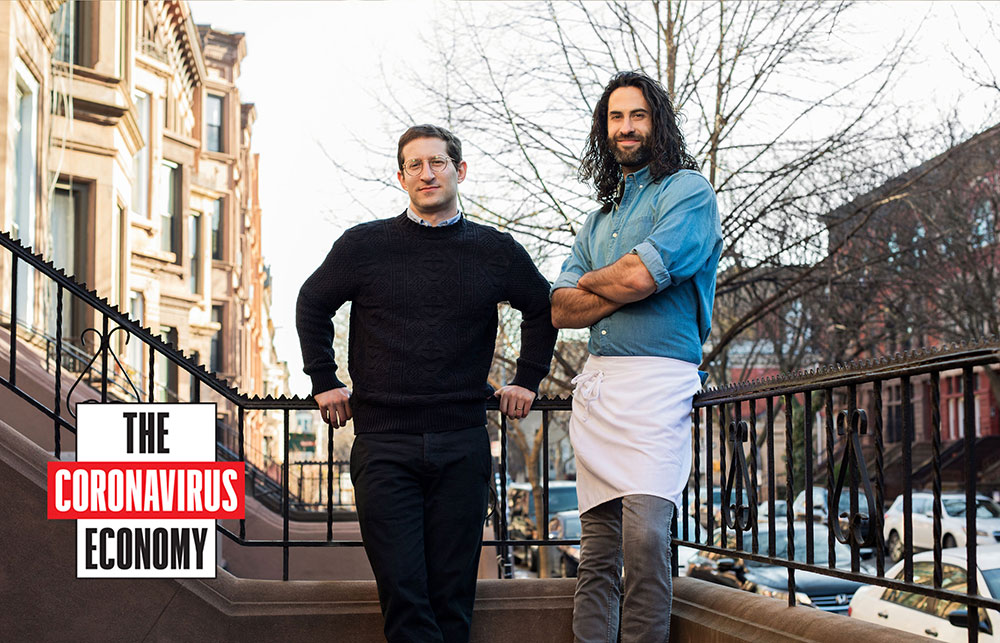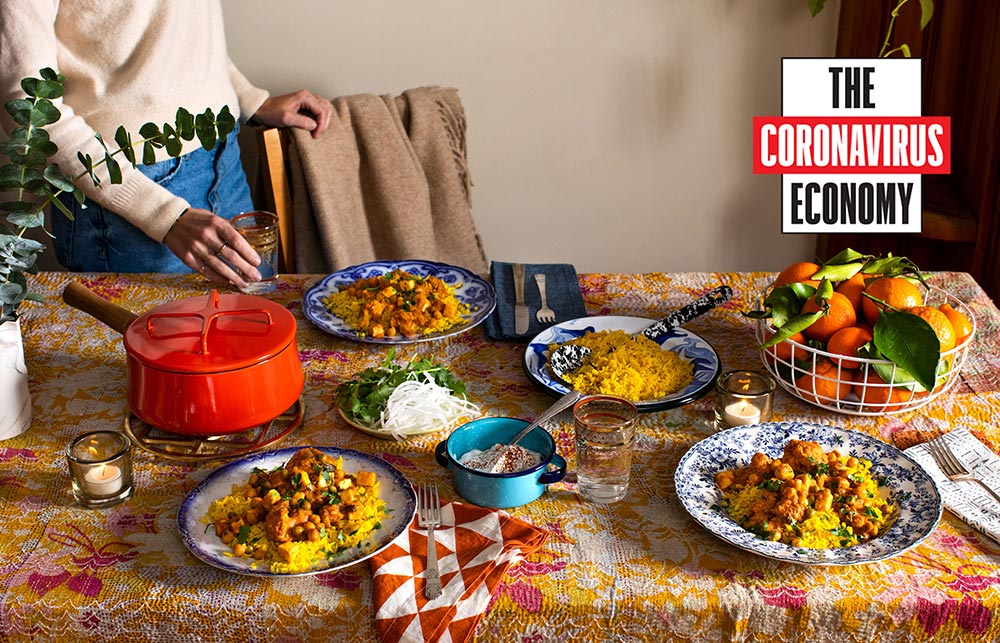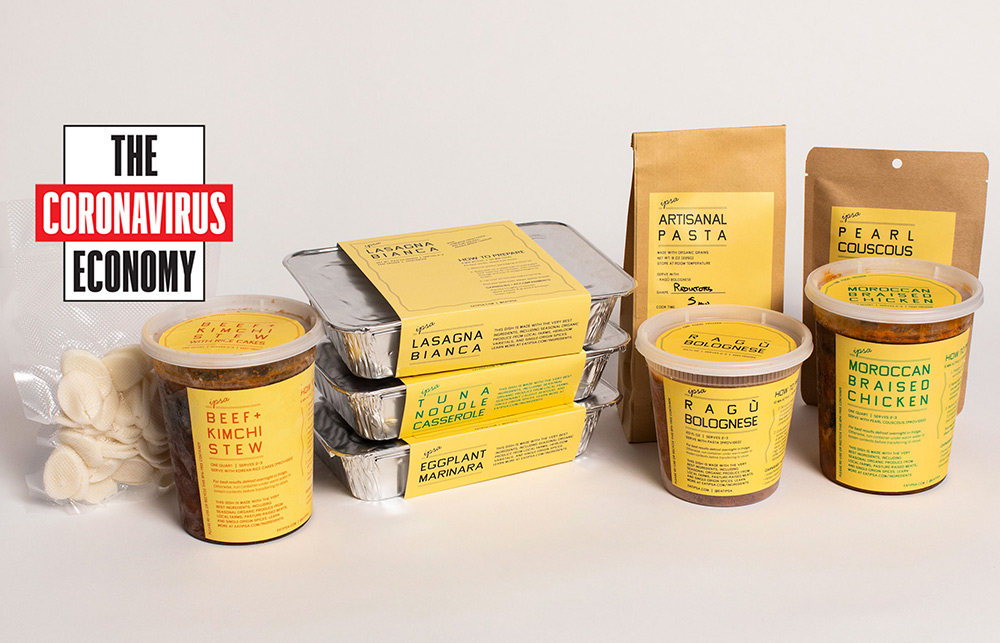在可以預(yù)見的未來,,越來越多的顧客將會選擇外帶用餐,,而這也將成為烹飪界迎來的最快變革之一。
《Zagat Future of Dining》本月發(fā)布的研究報(bào)告顯示,,90%的消費(fèi)者每周外賣點(diǎn)餐至少1到2次,,而在疫情發(fā)生前,這一數(shù)字為70%,。雖然全美各地的餐館已經(jīng)緩步恢復(fù)營業(yè),,但食客們對堂食仍然多少有些顧慮。Zagat的研究發(fā)現(xiàn),,多數(shù)食客打算至少三至四周后再去餐館吃飯,,而在此之前他們將選擇在家用餐。
現(xiàn)在,,外賣的選擇很多,。由于許多消費(fèi)者不想在超市大排場龍,越來越多的雜貨店開始提供訂餐服務(wù),,訂餐選擇也越發(fā)多樣,,許多商家的外賣銷量也迎來了大幅增長。
Ipsa Provisions由來自線上訂餐平臺Blue Apron和Chipotle及多家高檔餐廳的業(yè)內(nèi)資深人士創(chuàng)辦,,其創(chuàng)立宗旨是打造“新型冷凍食品企業(yè)”,。該公司所提供的餐品均在紐約市的一家小型商業(yè)廚房現(xiàn)場制作,包括雞肉玉米餅湯,、胡桃南瓜烤寬面條,、椰子咖喱及牛肉泡菜燉菜等。
近期,,《財(cái)富》雜志采訪了Ipsa Provisions的聯(lián)合創(chuàng)始人喬舒亞·布勞與米卡·弗雷德曼,詢問了疫情對其工作和未來看法的影響,,并了解了他們在過去幾個月中如何管理自身情緒和財(cái)務(wù)狀況,。
為簡明起見,以下采訪內(nèi)容有所刪改,。

《財(cái)富》:可以介紹下你們的背景么?創(chuàng)辦Ipsa Provisions的原因是什么,?
弗雷德曼:打小起我就是個美食愛好者,。在耶魯拿了不太實(shí)用的人文科學(xué)學(xué)士學(xué)位后,我給自己定了一個熟練掌握烹飪技巧的“五年計(jì)劃”,。為此,,我在格雷梅西酒館(Gramercy Tavern)、十一麥迪遜公園(Eleven Madison Park)的后廚工作過,,也走遍了墨西哥和意大利,,去過當(dāng)?shù)卦S多老奶奶家或高級或簡陋的廚房,。
喬舒亞對Ipsa的構(gòu)想非常吸引我,我也很愿意接受這種挑戰(zhàn),,與他一起重塑美國的冷凍食品行業(yè),。得益于自身的旅行經(jīng)歷和對餐廳廚房操作的了解,我對冷凍食品的可行性略知一二,。我喜歡挑戰(zhàn),,而改變?nèi)藗兊南敕ň褪且患挥刑魬?zhàn)性的工作,如果能用美食來實(shí)現(xiàn)這一目標(biāo)就更是再好不過了,。
布勞:我出生前,,父母就已經(jīng)在食品行業(yè)工作了。他們透過食物讓我懂得了許多生活道理,。往大了講,,幾乎所有主要的全球問題都與糧食有著直接關(guān)聯(lián)。往小了講,,食物與我們的生活也是息息相關(guān),。過去十年,我把大部分的時間都花在了打造更好的食品體系上,,也是在那段時間,,我越發(fā)確信,要想實(shí)現(xiàn)這一目標(biāo)就繞不開 “吃什么”和“怎么吃”的問題,。
話雖如此,,其實(shí)之前我也沒想到自己會主張對冷凍食品行業(yè)進(jìn)行全面的重新審視。在女兒出生前,,我們就預(yù)計(jì)到這個冬天會又冷又漫長,,再加上考慮到家里會添一個新生兒,所以我花了大量的時間來準(zhǔn)備吃的,。我凍了很多妻子最喜歡吃的菜,,這樣想吃的時候就很方便了。家里凍的菜吃掉一部分之后,,我就想著去雜貨店買些差不多的來補(bǔ)充一下存貨,,但出乎我意料之外的是,找遍雜貨店的冰柜也找不到相似的產(chǎn)品,。
于是我聯(lián)系了米卡,,看他是否有興趣跟我一起探索市場對這種食材考究、美味可口的冷凍食品是不是有需求,。我們是老相識,,而且我也一直很欣賞他的廚藝以及他對食物的理解。在最開始試運(yùn)營時,我們希望能通過貨真價(jià)實(shí),、分秒必爭的貼心服務(wù)為客戶提供最棒的家庭用餐體驗(yàn),,直至今日,這一目標(biāo)仍然是Ipsa的核心愿景所在,。

對許多消費(fèi)者而言,雜貨店的購物體驗(yàn)在過去幾個月中發(fā)生了巨大變化,。有些消費(fèi)者可能已經(jīng)轉(zhuǎn)而采用預(yù)訂或者外賣等方式來囤積一周的食材,。疫情對Ipsa的市場需求有什么影響?
布勞:因?yàn)镮psa剛開業(yè)四周就碰上了居家令,,所以不太好區(qū)分疫情前后的需求變化,。但開業(yè)后的這幾個月,市場需求確實(shí)遠(yuǎn)超我們的預(yù)期,。毫無疑問,,這跟疫情有很大關(guān)系。
對食品行業(yè)而言,,把在外面做好的食物或者半成品帶回家中用餐一直是很少有人關(guān)心的邊緣領(lǐng)域,,而我們就是要提升這一領(lǐng)域的品質(zhì)和檔次,包括餐廳外賣,、預(yù)加工食品,、生鮮送餐,當(dāng)然還有雜貨店的冷凍食品,。對食材有較高要求的客戶越來越多,,這個市場的規(guī)模也很大,但市場上缺乏能吸引這類人群的優(yōu)質(zhì)產(chǎn)品,。一直以來,,絕大多數(shù)情況下,我們都是在家用餐,,像現(xiàn)在這么高的比例已經(jīng)很多年沒有過了。即便是喜歡做飯的人,,也不會每頓飯都想自己做,。

也有人擔(dān)心食品配送的安全問題,一方面要避免新冠病毒通過食品包裝傳播,,另一方面也要保護(hù)那些提供基本服務(wù)的工作人員,。你們公司采取了哪些預(yù)防措施?疫情期間有沒有什么變化,?
弗雷德曼:“我是在紐約最頂級的一些餐館接受的訓(xùn)練,,所以從一開始,Ipsa的廚房就制定了非常嚴(yán)格的健康,、安全和衛(wèi)生標(biāo)準(zhǔn),。作為在那里工作過的年輕廚師,這些餐廳的高標(biāo)準(zhǔn)已經(jīng)融進(jìn)了我的靈魂之中,?!?/font>
疫情期間,我們執(zhí)行了更為嚴(yán)格的健康和安全標(biāo)準(zhǔn),。任何員工,,只要出現(xiàn)了可疑癥狀,就會被要求待在家里,。后廚員工到公司后會通過非接觸式體溫計(jì)測溫,,我們還給他們配備了用于更換的手套和口罩,供其在上班時使用,。我們的廚房很大,,所以廚師可以與同事保持適當(dāng)?shù)木嚯x。交班前,、后及上班期間都有受過專門訓(xùn)練的廚房維護(hù)人員對廚房進(jìn)行清掃,、消毒。我們還對廚房供貨和物品接收,、處理方法做了嚴(yán)格規(guī)定,。配送人員和送貨司機(jī)在上班時要穿戴適當(dāng)?shù)姆雷o(hù)服,并且要求進(jìn)行非接觸式送貨,。
你覺得未來數(shù)周,、數(shù)月消費(fèi)者會怎么購買食品?有些地方已經(jīng)取消了管制措施,,外賣送餐的需求會不會繼續(xù)增加,?在這種經(jīng)濟(jì)環(huán)境中,Ipsa是否打算擴(kuò)張自己的業(yè)務(wù),?
布勞:現(xiàn)在討論人們的習(xí)慣在長期會產(chǎn)生多大變化還為時尚早,。但毫無疑問,包括生鮮、快餐在內(nèi)的各種外賣送餐服務(wù)將會在我們的日常工作中扮演更重要的角色,。要想實(shí)現(xiàn)外賣送餐業(yè)務(wù)的可持續(xù)發(fā)展,,食品企業(yè)需要重新思考自己的商業(yè)模式,這對很多公司來說都是一項(xiàng)挑戰(zhàn),。
由于Ipsa獨(dú)特的服務(wù)滿足了當(dāng)前這種特殊時期的需要,,所以現(xiàn)階段的潛在機(jī)遇比預(yù)期要多出許多。我們希望能實(shí)現(xiàn)有序,、可控的增長,,從而確保客戶能夠獲得優(yōu)質(zhì)的體驗(yàn),。我們認(rèn)為,,現(xiàn)在關(guān)鍵是要打好運(yùn)營基礎(chǔ),以支撐未來幾年我們想看到的高速增長,。
新冠疫情對你個人有什么影響,,你過得怎樣?
弗雷德曼:過去幾個月的狀態(tài)就像坐過山車——恐懼,、悲傷,、昂揚(yáng)、孤獨(dú),、困惑,、希望還有絕望,一天之中你都會感受到,。面對現(xiàn)階段的不確定性,,我很慶幸能有這樣一份為人們提供食物的工作,一方面讓我可以踏實(shí)下來,,另一方面對我而言也是一種激勵,。
布勞:謝謝你的關(guān)心。和大多數(shù)人一樣,,我的心情也是起起伏伏的,。有時也會感覺疲憊不堪。但有兩件事最讓我感到振奮:第一,,在這樣一個非常艱難的時期,,Ipsa能讓消費(fèi)者吃得更好,過得更輕松,。第二,,我體驗(yàn)到了一種新的(謹(jǐn)慎)樂觀心態(tài)。過去幾個月中發(fā)生的一切,,讓我們意識到必須直面嚴(yán)峻的社會挑戰(zhàn)。看到Ipsa已經(jīng)開始行動,,為推動早就該進(jìn)行的結(jié)構(gòu)性變革貢獻(xiàn)著自己的力量,,我感到很高興。(財(cái)富中文網(wǎng))
譯者:Feb
在可以預(yù)見的未來,,越來越多的顧客將會選擇外帶用餐,,而這也將成為烹飪界迎來的最快變革之一。
《Zagat Future of Dining》本月發(fā)布的研究報(bào)告顯示,,90%的消費(fèi)者每周外賣點(diǎn)餐至少1到2次,,而在疫情發(fā)生前,這一數(shù)字為70%,。雖然全美各地的餐館已經(jīng)緩步恢復(fù)營業(yè),,但食客們對堂食仍然多少有些顧慮。Zagat的研究發(fā)現(xiàn),,多數(shù)食客打算至少三至四周后再去餐館吃飯,,而在此之前他們將選擇在家用餐。
現(xiàn)在,,外賣的選擇很多,。由于許多消費(fèi)者不想在超市大排場龍,越來越多的雜貨店開始提供訂餐服務(wù),,訂餐選擇也越發(fā)多樣,,許多商家的外賣銷量也迎來了大幅增長。
Ipsa Provisions由來自線上訂餐平臺Blue Apron和Chipotle及多家高檔餐廳的業(yè)內(nèi)資深人士創(chuàng)辦,,其創(chuàng)立宗旨是打造“新型冷凍食品企業(yè)”,。該公司所提供的餐品均在紐約市的一家小型商業(yè)廚房現(xiàn)場制作,包括雞肉玉米餅湯,、胡桃南瓜烤寬面條,、椰子咖喱及牛肉泡菜燉菜等。
近期,,《財(cái)富》雜志采訪了Ipsa Provisions的聯(lián)合創(chuàng)始人喬舒亞·布勞與米卡·弗雷德曼,,詢問了疫情對其工作和未來看法的影響,并了解了他們在過去幾個月中如何管理自身情緒和財(cái)務(wù)狀況,。
為簡明起見,,以下采訪內(nèi)容有所刪改。
《財(cái)富》:可以介紹下你們的背景么,?創(chuàng)辦Ipsa Provisions的原因是什么,?
弗雷德曼:打小起我就是個美食愛好者。在耶魯拿了不太實(shí)用的人文科學(xué)學(xué)士學(xué)位后,,我給自己定了一個熟練掌握烹飪技巧的“五年計(jì)劃”,。為此,,我在格雷梅西酒館(Gramercy Tavern)、十一麥迪遜公園(Eleven Madison Park)的后廚工作過,,也走遍了墨西哥和意大利,,去過當(dāng)?shù)卦S多老奶奶家或高級或簡陋的廚房。
喬舒亞對Ipsa的構(gòu)想非常吸引我,,我也很愿意接受這種挑戰(zhàn),,與他一起重塑美國的冷凍食品行業(yè)。得益于自身的旅行經(jīng)歷和對餐廳廚房操作的了解,,我對冷凍食品的可行性略知一二,。我喜歡挑戰(zhàn),而改變?nèi)藗兊南敕ň褪且患挥刑魬?zhàn)性的工作,,如果能用美食來實(shí)現(xiàn)這一目標(biāo)就更是再好不過了,。
布勞:我出生前,父母就已經(jīng)在食品行業(yè)工作了,。他們透過食物讓我懂得了許多生活道理,。往大了講,幾乎所有主要的全球問題都與糧食有著直接關(guān)聯(lián),。往小了講,,食物與我們的生活也是息息相關(guān)。過去十年,,我把大部分的時間都花在了打造更好的食品體系上,,也是在那段時間,我越發(fā)確信,,要想實(shí)現(xiàn)這一目標(biāo)就繞不開 “吃什么”和“怎么吃”的問題,。
話雖如此,其實(shí)之前我也沒想到自己會主張對冷凍食品行業(yè)進(jìn)行全面的重新審視,。在女兒出生前,,我們就預(yù)計(jì)到這個冬天會又冷又漫長,再加上考慮到家里會添一個新生兒,,所以我花了大量的時間來準(zhǔn)備吃的,。我凍了很多妻子最喜歡吃的菜,這樣想吃的時候就很方便了,。家里凍的菜吃掉一部分之后,,我就想著去雜貨店買些差不多的來補(bǔ)充一下存貨,但出乎我意料之外的是,,找遍雜貨店的冰柜也找不到相似的產(chǎn)品,。
于是我聯(lián)系了米卡,看他是否有興趣跟我一起探索市場對這種食材考究,、美味可口的冷凍食品是不是有需求,。我們是老相識,,而且我也一直很欣賞他的廚藝以及他對食物的理解。在最開始試運(yùn)營時,,我們希望能通過貨真價(jià)實(shí),、分秒必爭的貼心服務(wù)為客戶提供最棒的家庭用餐體驗(yàn),直至今日,,這一目標(biāo)仍然是Ipsa的核心愿景所在。
對許多消費(fèi)者而言,,雜貨店的購物體驗(yàn)在過去幾個月中發(fā)生了巨大變化,。有些消費(fèi)者可能已經(jīng)轉(zhuǎn)而采用預(yù)訂或者外賣等方式來囤積一周的食材。疫情對Ipsa的市場需求有什么影響,?
布勞:因?yàn)镮psa剛開業(yè)四周就碰上了居家令,,所以不太好區(qū)分疫情前后的需求變化。但開業(yè)后的這幾個月,,市場需求確實(shí)遠(yuǎn)超我們的預(yù)期,。毫無疑問,這跟疫情有很大關(guān)系,。
對食品行業(yè)而言,,把在外面做好的食物或者半成品帶回家中用餐一直是很少有人關(guān)心的邊緣領(lǐng)域,而我們就是要提升這一領(lǐng)域的品質(zhì)和檔次,,包括餐廳外賣,、預(yù)加工食品、生鮮送餐,,當(dāng)然還有雜貨店的冷凍食品,。對食材有較高要求的客戶越來越多,這個市場的規(guī)模也很大,,但市場上缺乏能吸引這類人群的優(yōu)質(zhì)產(chǎn)品,。一直以來,絕大多數(shù)情況下,,我們都是在家用餐,,像現(xiàn)在這么高的比例已經(jīng)很多年沒有過了。即便是喜歡做飯的人,,也不會每頓飯都想自己做,。
也有人擔(dān)心食品配送的安全問題,一方面要避免新冠病毒通過食品包裝傳播,,另一方面也要保護(hù)那些提供基本服務(wù)的工作人員,。你們公司采取了哪些預(yù)防措施?疫情期間有沒有什么變化,?
弗雷德曼:“我是在紐約最頂級的一些餐館接受的訓(xùn)練,,所以從一開始,,Ipsa的廚房就制定了非常嚴(yán)格的健康、安全和衛(wèi)生標(biāo)準(zhǔn),。作為在那里工作過的年輕廚師,,這些餐廳的高標(biāo)準(zhǔn)已經(jīng)融進(jìn)了我的靈魂之中?!?/font>
疫情期間,,我們執(zhí)行了更為嚴(yán)格的健康和安全標(biāo)準(zhǔn)。任何員工,,只要出現(xiàn)了可疑癥狀,,就會被要求待在家里。后廚員工到公司后會通過非接觸式體溫計(jì)測溫,,我們還給他們配備了用于更換的手套和口罩,,供其在上班時使用。我們的廚房很大,,所以廚師可以與同事保持適當(dāng)?shù)木嚯x,。交班前、后及上班期間都有受過專門訓(xùn)練的廚房維護(hù)人員對廚房進(jìn)行清掃,、消毒,。我們還對廚房供貨和物品接收、處理方法做了嚴(yán)格規(guī)定,。配送人員和送貨司機(jī)在上班時要穿戴適當(dāng)?shù)姆雷o(hù)服,,并且要求進(jìn)行非接觸式送貨。
你覺得未來數(shù)周,、數(shù)月消費(fèi)者會怎么購買食品,?有些地方已經(jīng)取消了管制措施,外賣送餐的需求會不會繼續(xù)增加,?在這種經(jīng)濟(jì)環(huán)境中,,Ipsa是否打算擴(kuò)張自己的業(yè)務(wù)?
布勞:現(xiàn)在討論人們的習(xí)慣在長期會產(chǎn)生多大變化還為時尚早,。但毫無疑問,,包括生鮮、快餐在內(nèi)的各種外賣送餐服務(wù)將會在我們的日常工作中扮演更重要的角色,。要想實(shí)現(xiàn)外賣送餐業(yè)務(wù)的可持續(xù)發(fā)展,,食品企業(yè)需要重新思考自己的商業(yè)模式,這對很多公司來說都是一項(xiàng)挑戰(zhàn),。
由于Ipsa獨(dú)特的服務(wù)滿足了當(dāng)前這種特殊時期的需要,,所以現(xiàn)階段的潛在機(jī)遇比預(yù)期要多出許多。我們希望能實(shí)現(xiàn)有序,、可控的增長,,從而確??蛻裟軌颢@得優(yōu)質(zhì)的體驗(yàn)。我們認(rèn)為,,現(xiàn)在關(guān)鍵是要打好運(yùn)營基礎(chǔ),,以支撐未來幾年我們想看到的高速增長。
新冠疫情對你個人有什么影響,,你過得怎樣,?
弗雷德曼:過去幾個月的狀態(tài)就像坐過山車——恐懼、悲傷,、昂揚(yáng),、孤獨(dú)、困惑,、希望還有絕望,一天之中你都會感受到,。面對現(xiàn)階段的不確定性,,我很慶幸能有這樣一份為人們提供食物的工作,一方面讓我可以踏實(shí)下來,,另一方面對我而言也是一種激勵,。
布勞:謝謝你的關(guān)心。和大多數(shù)人一樣,,我的心情也是起起伏伏的,。有時也會感覺疲憊不堪。但有兩件事最讓我感到振奮:第一,,在這樣一個非常艱難的時期,,Ipsa能讓消費(fèi)者吃得更好,過得更輕松,。第二,,我體驗(yàn)到了一種新的(謹(jǐn)慎)樂觀心態(tài)。過去幾個月中發(fā)生的一切,,讓我們意識到必須直面嚴(yán)峻的社會挑戰(zhàn),。看到Ipsa已經(jīng)開始行動,,為推動早就該進(jìn)行的結(jié)構(gòu)性變革貢獻(xiàn)著自己的力量,,我感到很高興。(財(cái)富中文網(wǎng))
譯者:Feb
For the culinary world, one of the most rapid transformations that looks as if it will hold for the foreseeable future is that customers are ordering takeout more than ever.
Nine in 10 consumers are ordering takeout (as opposed to seven in 10 before the pandemic) at least one to two times per week, according to the Zagat Future of Dining study published this month. And as restaurants slowly begin to reopen across the country, diners remain wary of going back. Zagat found most diners plan to wait at least three to four weeks before returning to restaurants, opting instead for more meals at home.
But not all takeout is one and the same. There are more and more grocery and meal subscription kits available, many of which are surging in sales as consumers shy away from long lines at supermarkets.
Founded by veterans of Blue Apron, Chipotle, and upscale restaurants, Ipsa Provisions aims to be a “new kind of frozen food company.” Meals are made from scratch in a small commercial kitchen in New York City, with menu items such as chicken tortilla soup, a butternut squash lasagna, coconut curry, and beef and kimchi stew.
Fortune spoke with cofounders Joshua Brau and Micah Fredman for a new series, The Coronavirus Economy, about how the outbreak has affected their business, their thoughts on the future, and how they have been handling these past fraught few months, both emotionally and financially.
The following interview has been lightly edited and condensed for clarity.
Fortune: Could you tell me a little bit about your background? What inspired the launch of Ipsa Provisions?
Fredman: I’ve loved food for as long as I can remember. After receiving a rather impractical BA in Humanities from Yale, my five-year plan—to master the craft of cooking—took me through the kitchens of Gramercy Tavern, Eleven Madison Park, and a number of humbler and wiser kitchens of grandmothers throughout Mexico and Italy.
When Josh approached me to pilot the Ipsa concept, I was enthralled by the challenge of redeeming the American freezer. My travels and knowledge of restaurant kitchen operations had shown me glimpses of the freezer’s possibilities. I love an underdog. I love the challenge of changing people’s minds, and deliciousness is my favorite way of doing it.
Brau: Both of my parents have been in the food industry since before I was born. They helped me see so much of life through the lens of food. On a macro level, there are direct linkages between the food and just about every major global issue. And at the micro level, food obviously plays an essential role in so many aspects of our lives. I’ve spent the better part of the last decade working to build a better food system, and over that time I’ve become convinced that doing so requires rethinking how and what we eat at home.
That said, I never expected I’d be advocating for a wholesale rethinking of the freezer. Before my daughter was born, I spent a good amount of time cooking and freezing large batches of some of my wife’s favorite dishes so we’d have them ready to go during what we correctly predicted was a long cold winter with a newborn. As our homemade stash dwindled, I was surprised to find that I couldn’t find anything comparable in grocery store freezer aisles.
So I approached Micah to see if he was interested in exploring whether there was a market for seriously tasty frozen food made with superb ingredients. Micah and I had known each other for a long time, and I always admired his cooking and his approach to food more broadly. The early pilots we ran aspired to accomplish something that remains at the core of our vision for Ipsa: to deliver an experience that is—dollar-for-dollar and minute-for-minute of active effort—the best meal you can put on your table at home.
For many consumers, grocery shopping has changed dramatically over the past few months. Some consumers might be turning to alternative services, like subscription and delivery programs, to stock up on food and meals for the week. How has demand for Ipsa fared since the onset of the pandemic?
Brau: It’s difficult to untangle demand before and after the onset of the pandemic because we launched Ipsa about four weeks before stay-at-home orders were put in place. What we have seen is demand for our food that far exceeds what we expected for our first few months in operation. There’s no question the pandemic has a lot to do with that.
Our concept is focused on elevating what has been a fairly lackluster corner of the food industry: meals that are eaten at home, but cooked partially or entirely outside of it. This includes restaurant takeout, prepared foods, fresh meal delivery services, and of course, the grocery store frozen food aisle. Despite the massive size of this market, there’s very little out there that’s compelling to the growing ranks of people who want to eat really well all the time. It’s always been the case that the vast majority of meals are eaten at home, but that proportion is as high now as it’s been in a very, very long time. Even people who love to cook don’t want to cook every single meal.
There have been some concerns about the safety of food delivery—not only of preventing the transmission of COVID-19 via food packaging but also protecting employees who are providing an essential service. What kind of precautions has your business set up, and have any of those changed during the pandemic?
Fredman: I trained at some of New York’s finest restaurants, so Ipsa’s kitchen standards for health, safety, and cleanliness were rigorous from the start. These restaurants instill high standards into the core of your being as a young chef.
Operating during the pandemic, our health and safety protocols have only become more stringent. Any employee that experienced any hint of a possible symptom was asked to stay home. Our kitchen employees are scanned with a noncontact thermometer upon arrival and provided with gloves (changed frequently) and face masks for use during their shifts. Our kitchen is spacious enough that cooks are able to maintain appropriate distance from colleagues. The kitchen is sanitized by a trained kitchen maintenance person before, during, and after each shift. Strict protocols govern how deliveries are made to the kitchen and how staff treat items when they are received. Fulfillment staff and delivery drivers wear appropriate protective gear during their shifts, and noncontact delivery is our standard.
Looking toward the next few weeks and months, how do you expect consumers will continue to shop for food? Do you expect more interest in delivered meals, even as restrictions lift in some areas? And does Ipsa plan to expand in this economic climate?
Brau: It’s too early to tell how dramatically habits will shift in the long run. But there’s no question that delivered food—groceries, meals, et cetera—will figure more prominently in our routines. The challenge for many food businesses will be to rethink their business models so the economics of delivery are sustainable.
Given the unique ways in which Ipsa’s offering is suited to this particular moment, we’re facing more potential avenues for expansion than we anticipated at this stage of the business. We’re focused on growing intentionally, so we can maintain the quality of the experience we deliver to our customers. We believe it’s critical to build an operational foundation now that can sustain the more aggressive growth we’d like to see in the coming years.
On a personal note, how have you been faring amid all this?
Fredman: These past couple months have been quite the mental-emotional roller coaster—fear, sorrow, drive, loneliness, confusion, hope, and hopelessness—all in the course of a day. I am incredibly grateful to have had this work of feeding people to both ground and propel me amidst all the uncertainty.
Brau: Thank you for asking. Like most people, I experience ups and downs. Sometimes I’m exhausted. But more than anything I’m energized by two things: first, the simple fact that Ipsa is helping make things a little easier and a little more delicious for our customers during a very difficult period in their lives. Second, I’m experiencing a newfound—albeit cautious—optimism. The events of the last few months have made it impossible to ignore the depth of the challenges we face as a society, and I’m excited to see Ipsa participate in any way we can, large or small, to help bring about structural changes that are long overdue.






